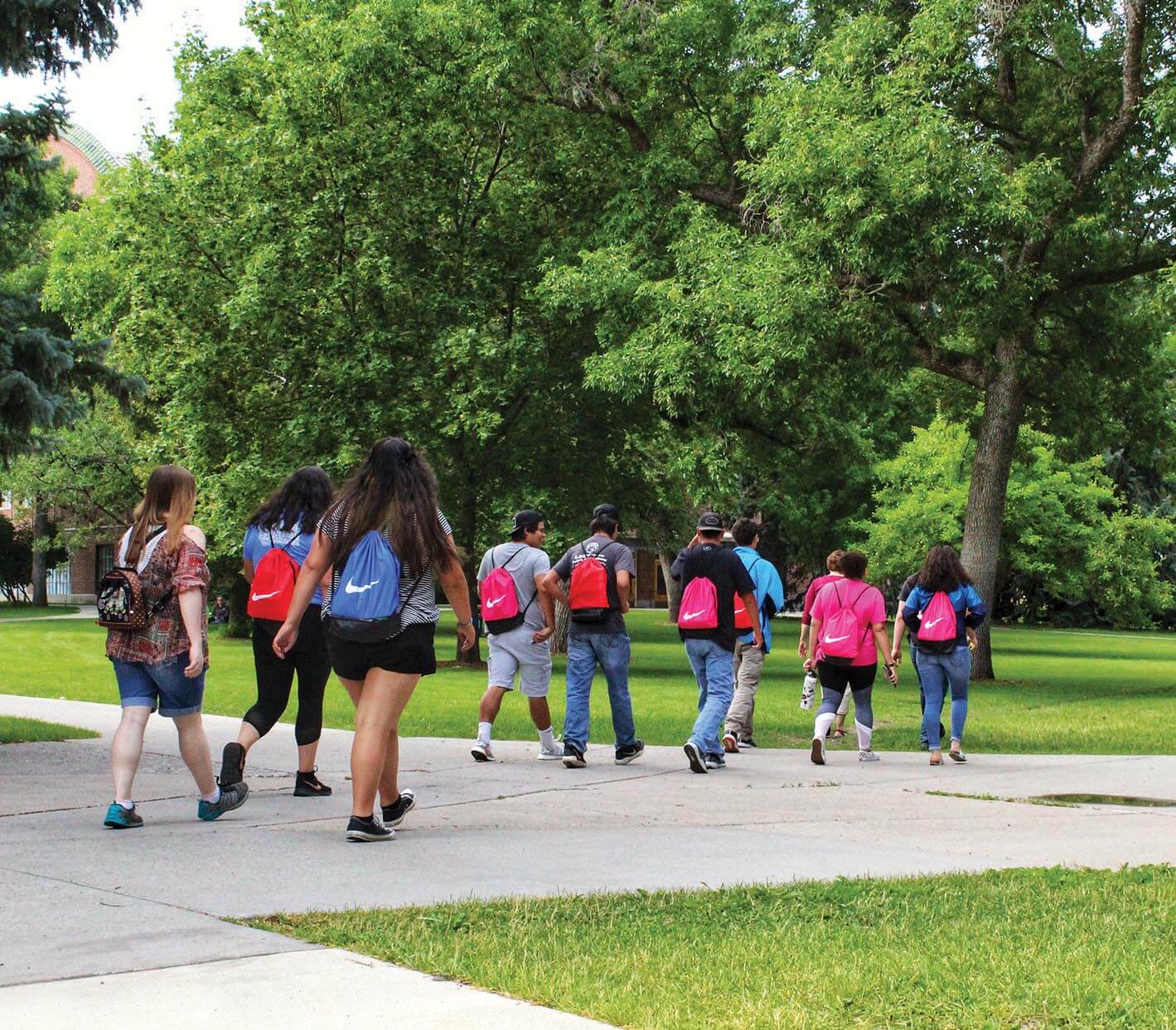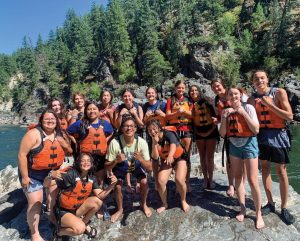
30 May Round Up: Nonprofit Spotlight: Hopa Mountain
For the past 20 years, Hopa Mountain has cultivated social, economic, and educational resilience in rural and tribal communities throughout the Northern Rockies. The Bozeman, Montana-based organization invests in “citizen leaders” — adults and youth active in developing their respective communities — to support historically underserved populations. In turn, these leaders return to their communities with innovative outreach programs, improved services, essential resources, and education.

Hopa Mountain’s Medical Mentorship and Health Scholar of Promise programs provide a range of support services to students pursuing careers throughout the healthcare industry and related fields. COURTESY OF HOPA MOUNTAIN
Here, Hopa Mountain co-founder and executive director Bonnie Sachatello-Sawyer shares the vision that inspired the nonprofit’s success and the hope that drives all that lies ahead.
BIG SKY JOURNAL: Tell us a little about the history of Hopa Mountain.
BONNIE SACHATELLO-SAWYER: “Hopa” is the Old English word for “hope” and, at its foundation, Hopa Mountain has an unwavering conviction that hope is a fundamental prerequisite for positive change.
Founded in 2004, Hopa Mountain invests in rural and tribal citizen leaders who provide that fundamental hope by improving their communities. Citizen leaders step forward when they recognize that their community needs help. When we offer these leaders training, mentoring, networking opportunities, and financial resources, Hopa Mountain advances the health and well-being of the entire community. Sustained community improvements lie in the strength, innate wisdom, and creativity of local people — in their relationships with each other and with the land — they know their communities’ needs and, thus, have the most plausible and practical solutions.
All of our initiatives are generational, long-haul investments in rural and tribal local leaders. They are designed to support citizen leadership and civic engagement. Today, 20 years since Hopa’s inception, this support is particularly timely and necessary as these leaders work tirelessly to provide essential services, such as food, healthcare, and family educational resources.
BSJ: What are “citizen leaders,” and how do they factor into Hopa Mountain’s mission?
SACHATELLO-SAWYER: Citizen leaders are active community members to whom others naturally turn for help. There is a growing recognition of the importance of citizen leaders in underserved communities, many of which are home to ethnic and racial minority groups historically marginalized from institutionalized education, leadership roles, and cultural, environmental, and healthcare systems.

Offered in partnership with the Washington, Wyoming, Alaska, Montana, and Idaho (WWAMI) Regional Medical Education Program, Hopa’s Medical Mentorship Program provides minority undergraduate students pursuing a career in the field of medicine with mentorship support. COURTESY OF HOPA MOUNTAIN
Essentially, citizen leaders are the frontline and the future. Hopa Mountain currently serves 16,000 people each year through mentorship and leadership programs — including Strengthening the Circle, Scholars of Promise, and the Medical Mentorship Program, among others — that invest in both established and evolving leaders as they prepare to succeed in college and serve their communities.
In response to COVID, Hopa Mountain reorganized all of its programs to invest in the immediate needs of rural and tribal nonprofits, food pantries, and clinics. Launching Local Food for Local Families expanded access to healthy Montana-grown food through food hubs and pantries, helping to meet the needs of rural and tribal families.
Together with our project partners, we are working to implement a range of support services to fill in gaps in our food-system infrastructure and support the health and wellbeing of regional families. Approximately 1 in 10 Montanans struggle with hunger, and nearly 37,000 children live in food-insecure homes. And while Montana produces substantial volumes of locally grown food, half of Montana’s 56 counties include food deserts — areas where at least 500 people, or 33 percent of the residents, must travel more than 10 miles to the nearest supermarket.
BSJ: How have Hopa Mountain’s foundational programs impacted the communities they serve?
SACHATELLO-SAWYER: Hopa Mountain’s goal is to contribute to the health and vitality of rural and tribal communities across the Northern Rockies and Great Plains. By encouraging citizen leaders’ ideas using strength-based approaches to individual and community change — and linking them to additional resources, including regional and national networks — we are enlarging their bases of support while contributing to the long-term vitality of their respective communities through reduced poverty, access to healthy food, improved economic conditions, and increased graduation rates
All of Hopa Mountain’s core programs are generational, collaborative efforts. For more than 18 years, Strengthening the Circle has helped build the capacity of experienced and emerging Native-led nonprofit organizations working to improve economic development, education, and social services on or near reservations through coordination with key program partners, including Seventh Generation Fund, Generations Indigenous Ways, Artemisia Associates, and WolfStar Productions.

Through support programming geared toward both individuals and organizations, Hopa Mountain invests in rural and tribal citizen leaders who are improving education, ecological health, and economic development in their communities and beyond. COURTESY OF HOPA MOUNTAIN
Hopa Mountain’s Scholars of Promise partners students, parents, school counselors, administrators, college support staff, and generous funders to match scholars with the colleges for which they are best suited. Working together with rural and tribal communities, we help young people successfully prepare for college while building a network between them, their parents, appropriate mentors, and higher education institutions.
Mission West Community Development Partners, Western Montana Growers Cooperative, Livingston Food Resource Center, Community Food and Agriculture Coalition, and the Montana Food Bank Network are all engaged with us in the Local Food for Local Families initiative. By working together, we build upon our distinct organizational strengths, increase efficiencies, improve local food security, and expand market opportunities to realize a Montana-focused food system that benefits local growers, producers, businesses, and families.
BSJ: What do you envision for Hopa Mountain’s growth and impact over the next 20 years, and how can people get involved in realizing that vision?
SACHATELLO-SAWYER: Over the past two decades, Hopa Mountain’s board and staff have made significant progress with our short-term goals, which involve training rural and tribal citizen leaders and organizing gatherings in support of Native nonprofits, food security, and youth development. Additionally, staff has worked to increase the number of resources available to regional Native nonprofits and leaders’ access to regional networks and funding resources.
The longer-term goals of improving access to quality community education, increasing food security and economic resources to decrease high poverty rates, and improving overall health and well-being are still to be realized. These generational goals require extended education and support to fundamentally restructure opportunities in rural and tribal communities.
We want to encourage people everywhere to think critically about our region and the growing economic and educational inequalities. We want to encourage everyone across the Northern Rockies region to actively engage in community vitality initiatives, to work for a better future for all.
For more information about Hopa Mountain’s programming, or to support its important work throughout the region, visit hopamountain.org.




No Comments